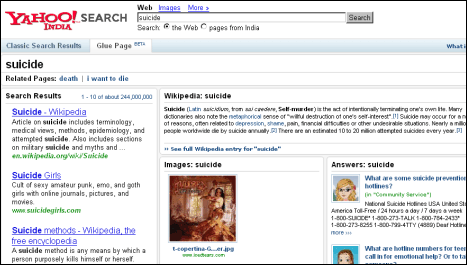Thursday, May 15, 2008
Searching Google and Others for Suicide
“Suicide” is a potentially important search query because it may be entered by people contemplating committing suicide. Both Google and Yahoo in 2008 give relevant results of sites trying to help people or educate them on the subject; at both search engines, the number one result is a Wikipedia entry, and the second result is a page titled “Suicide: Read This First”. Back in 2003, some of the top Google results for this and related queries included music bands.
Of the three major search engines, only Microsoft’s Live.com – if you want to call it a major search engine – returns much worse results (at least in my opinion; there doesn’t seem to be a really neutral way to judge search results quality). Note that while I chose Live.com and the page displayed in English, it was apparently geolocated to my German location behind the scenes, so you may or may not receive more relevant results in other locations. To me, Live.com shows a fan page for the game Suicide Commando in the first spot, and information on Suicide the Movie in the second. Such links may fare better in lower positions or when triggered by related search suggestions. In fact, among all the top 10 results at Live.com, there is not a single spot reserved for something outside of things like band, game, or fashion names – including the top advertisement here, which offers a “great selection of fashion items.” Even Ask.com’s result are better than this.
One page available both in the Yahoo and Google top 10 though made it into the result despite of (or because of) apparently being over-optimized. Here’s the snippet Google shows for PageRank 5 homepage Suicide.org, at organic result spot number 5:
As you can see, the word “suicide” is repeated numerous times without any apparent benefit to the human visitor. Where does this snippet come from? It’s not from the page’s main content, but is used in the meta description:
But not only is “suicide” listed many times in the meta description, it’s also repeated in the title of the page, its meta keywords, and elsewhere. From what we know Google ignores the meta keywords anyway, and may also ignore the meta description when it comes to ranking – even when it’s displayed in the result – so if this is overzealous SEO, it’s not the smartest type. Urging people to link to the site using banners, as site owner Kevin C. does elsewhere, might be a much better solution; after all, this non-profit site does offer real information on suicide.
Now, Google does not just return organic web pages for the “suicide” query. They also return a Google News onebox, an algorithmic selection of stories from originally hand-picked news publishers on the subject of suicide bombings. The ad at Google seems relevant too, as it reads “Samaritans - 24 hour confidential emotional support.” In 2006, Google also returned a Google Health onebox showing further links like “Treatment”, “Tests/diagnosis”, “For patients”, “Symptoms”, “Causes/risk factors”, “Alternative medicine” and more. This particular health onebox is gone now (at least here, results may vary) though it still appears for other queries, like depression.
This Google result set is not as rich though as what Yahoo India offers with their new Glue Pages feature. Search for “suicide” over there and you get a broad spectrum of answers. It’s after all a very ambiguous query, far more general than e.g. “how to commit suicide”, “depression help” or “I want to end my life” may be. Yahoo’s page includes normal web results, a Wikipedia definition of suicide, images showing bands or people posing or suicide letters, answers from Yahoo Answers, YouTube videos and more:
(The bottom of Yahoo’s glue page asks you to contact glue.publishers@yahoo.com with the name of yourself and your site if you want to add your content there.)
While this Yahoo page looks more advanced compared to the one offered by Google, I’m not sure if comprehensiveness and multimedia results are a great fit for all queries – sometimes it may be just too much, especially on topics requiring a more serious answer. The organic web results, too, are changed on this glue page, but that seems to be related to the fact that it’s Yahoo India, as even the classic view shows these different results; the second spot links to Suicide Girls, an adult site, and the third result links to Wikipedia’s article on suicide methods.
What happens if I switch languages over at Google? Searching Google.de for the word “Selbstmord” (“suicide” in German) while being logged out returns a Wikipedia result on the subject on top. The second spot is inhibited by a page which, according to the snippet shown in Google, details suicide methods (at www.selbstmord.co.at/selbstmord.htm). However, clicking on the URL will redirect you to another page which does not contain the text the snippet was showing; this kind of redirect may be against the Google webmaster guidelines, though that’s not certain. The third result at Google Germany reads “suicide is no solution”. Other results in the top 10 include suicide information, an article on what the site calls “digital suicide” (canceling social network accounts), and a page claiming that the domain Selbstmord.com is offered for sale. Below the organic web results, Google.de offers related searches including “suicide forum”, “suicide methods”, “types of suicide”, “.. poems”, “... chat” and “... tips”, while an advertisement above points to suicide tests.
>> More posts
Advertisement
This site unofficially covers Google™ and more with some rights reserved. Join our forum!

![[Repeating suicide many times]](/files/suicide-result-2008.png)
![[Repeating suicide many times in the meta description, and elsewhere in the]](/files/suicide-result-2008-2.png)
